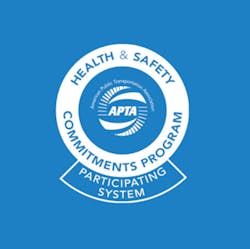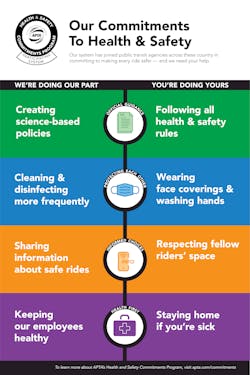More than 100 agencies have signed on to APTA’s ‘Health and Safety Commitments’ Program
The American Public Transportation Association (APTA) has launched a nationwide program outlining industry best practices – for both agencies and riders – as the COVID-19 crisis continues. So far, more than 100 agencies have signed onto the program.
The program defines broad safety categories that every public transportation agency can meet voluntarily and in its own way. APTA has provided a toolkit for agencies who have signed on to the program, which includes a “seal” – much like the Good Housekeeping Seal – to let riders know the system has implemented industry best practices.
The program was developed based on a survey of nationwide transit users who were asked what measures would help boost their confidence in riding transit. The answers helped identify four key areas where transit systems can focus their efforts to earn the confidence of riders:
- Following public health guidelines from official sources;
- Cleaning and disinfecting transit vehicles frequently and requiring face coverings and other protections;
- Keeping passengers informed and empowered to choose the safest times and routes to ride; and
- Putting health first by requiring riders and employees to avoid public transit if they have been exposed to COVID-19 or feel ill.
“This program emphasizes the commitment that this industry is making to all those we serve now and to those who we look forward to serving,” said Nuria I. Fernandez, APTA chair, and general manager and CEO of Santa Clara Valley Transportation Authority. “Public transportation is and will be vital to the social and economic recovery of our nation. But getting there requires us to win back our ridership and encourage new riders to view public transit as a preferred mobility choice. We believe this commitment program will help do this.”
Phil Washington, APTA Mobility Recovery and Restoration Task Force chair and CEO of Los Angeles County Metropolitan Transportation Authority built on Fernandez’s point by noting rider confidence will be gained through time, effort and repetition of good practices.
In announcing this new industry-wide pledge, the industry reiterated its urgent request that Congress and the administration provide at least $32 billion in emergency funding to ensure that public transit services can continue to operate to serve essential front-line employees and to aid in the nation’s recovery.
“The program being launched today is the public transportation industry’s pledge to promote sensible policies and practices designed to keep transit users and transit employees safe during the COVID-19 crisis,” said APTA President and CEO Paul P. Skoutelas. “It is a logical extension of the innovation and commitment we have been demonstrating for the past several months – and it makes the need for at least $32 billion in additional emergency funding that much more urgent and critical.”
About the Author

Mischa Wanek-Libman
Group Editorial Director
Mischa Wanek-Libman is director of communications with Transdev North America. She has more than 20 years of experience working in the transportation industry covering construction projects, engineering challenges, transit and rail operations and best practices.
Wanek-Libman has held top editorial positions at freight rail and public transportation business-to-business publications including as editor-in-chief and editorial director of Mass Transit from 2018-2024. She has been recognized for editorial excellence through her individual work, as well as for collaborative content.
She is an active member of the American Public Transportation Association's Marketing and Communications Committee and served 14 years as a Board Observer on the National Railroad Construction and Maintenance Association (NRC) Board of Directors.
She is a graduate of Drake University in Des Moines, Iowa, where she earned a Bachelor of Arts degree in Journalism and Mass Communication.


